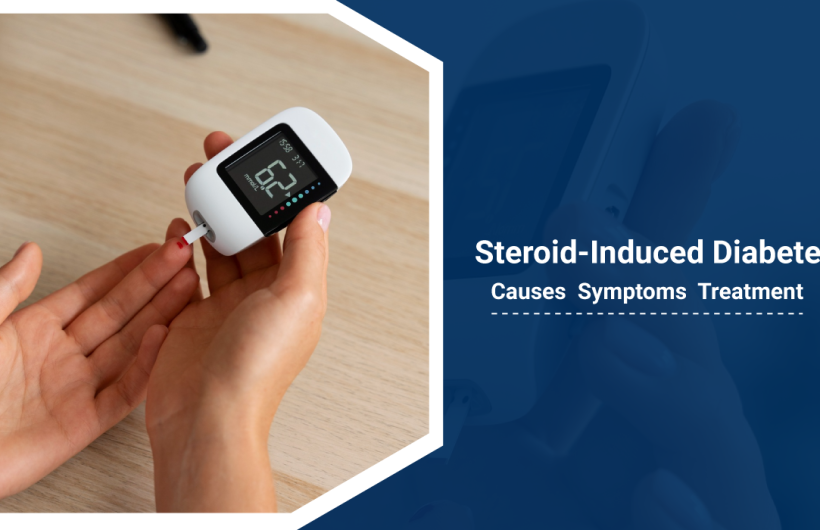What is Steroid-Induced Diabetes?
Steroid-induced diabetes, also known as steroid diabetes, is a form of diabetes that develops as a result of prolonged treatment with glucocorticoid medications such as prednisone or cortisone. These medications, commonly used to treat conditions like asthma, arthritis, and autoimmune diseases, can raise blood sugar levels and even trigger the onset of diabetes in some individuals. In this article, we will explore the causes, symptoms, and treatment options for steroid-induced diabetes.
What are the Causes of Steroid-Induced Diabetes?
Glucocorticoid medications like prednisone are synthetic versions of the hormone cortisol, which is naturally produced by the adrenal glands. Cortisol plays an important role in regulating blood sugar levels. However, when glucocorticoids are taken in high doses or for an extended period of time, they can interfere with how the body processes and uses glucose.
Specifically, glucocorticoids promote the breakdown of proteins and fat in order to increase blood sugar levels. They also inhibit the effects of insulin, the hormone that allows cells to take up and use glucose for energy. Together, these effects cause blood glucose to rise higher than normal. For some individuals, prolonged exposure to high levels of blood sugar from glucocorticoid use can eventually damage the insulin-producing beta cells in the pancreas. This beta cell dysfunction is what leads to the development of steroid-induced diabetes.
What are the risks of developing steroid-induced diabetes?
It depends on several factors:
- Dose of glucocorticoid: Higher daily doses and longer treatment durations increase risk.
- Treatment length: Risk rises the longer glucocorticoids are used, especially beyond 3 months.
- Genetics: Those with a family history of diabetes have a higher inherent risk.
- Other risk factors: Conditions like obesity, high blood pressure, and high cholesterol also enhance risk when combined with glucocorticoid use
Symptoms of Steroid-Induced Diabetes
The symptoms of steroid-induced diabetes are similar to those seen in type 1 diabetes and type 2 diabetes. Some common signs and symptoms include:
Increased thirst, Frequent urination, Fatigue, Blurred vision, Slow healing of cuts and wounds, Weight loss despite increased appetite, Nausea, vomiting, or stomach pains, Yeast infections, and trouble concentrating.
The onset of symptoms typically occurs within days to weeks of starting glucocorticoid treatment, depending on dosage and individual susceptibility. However, in some cases, steroid-induced diabetes may be asymptomatic, only discovered through routine blood sugar monitoring. Anyone taking glucocorticoids long-term should be tested periodically for high blood glucose.
Testing and Diagnosis
If symptoms arise during glucocorticoid treatment, a healthcare provider will perform blood tests to check blood glucose levels. A fasting blood glucose level of 126 mg/dL or higher on two separate occasions indicates diabetes. Additional tests may include:
Haemoglobin A1c (HbA1c) test: Measures average blood sugar over 3 months. An HbA1c level of 6.5% or higher confirms the diagnosis.
Oral glucose tolerance test: Measures blood sugar levels before and 2 hours after drinking a sugary drink. Levels of 200 mg/dL or higher indicate diabetes.
C-peptide test: Measures levels of C-peptide, a byproduct of insulin production. Low levels suggest insulin deficiency.
The diagnosis of steroid-induced diabetes requires ruling out other types through medical history and lab results. It is considered a temporary form of diabetes as long as glucocorticoid treatment continues.
Treatment and Management for steroid-induced diabetes
Treatment for steroid-induced diabetes focuses on managing blood sugar levels through lifestyle changes and medications. The primary goals are to prevent complications and control symptoms until glucocorticoid treatment ends.
Lifestyle modifications that may help control blood sugar include:
- Healthy diet: Focus on whole grains, fruits/veggies, lean protein. Limit sugar/refined carbs.
- Weight control: Maintain a healthy weight through diet and exercise if overweight.
- Regular exercise: Aim for 30 minutes daily to help cells use glucose and control blood sugar.
- Blood sugar monitoring: Check levels regularly as directed by your healthcare provider.
- Medications are often needed to supplement lifestyle changes. Common drug options include:
- Oral diabetes pills: Metformin, sulfonylureas, and DPP-4 inhibitors help lower blood sugar levels.
- Insulin: May be needed if pills alone do not provide adequate control. Dosage is adjusted based on blood sugar readings.
What are the Complications of Uncontrolled Steroid-Induced Diabetes?
If left unmanaged, high blood sugar levels from steroid-induced diabetes can potentially lead to serious long-term complications affecting many parts of the body. Some complications include:
- Eye problems: Retinopathy (eye damage), glaucoma, and cataracts are risks.
- Kidney disease: High blood sugar can damage the kidneys over time and potentially cause kidney failure.
- Nerve damage: Diabetic neuropathy causes pain, numbness, and weakness in the hands/feet.
- Heart disease and stroke: Diabetes increases the risks of heart attack, chest pain, and stroke due to damage to blood vessels.
- Skin and foot problems: Slow-healing cuts/wounds, infections, and foot ulcers are more common.
- Dental disease: Periodontitis (gum disease) and tooth loss are linked to long-term high blood sugar.
- Pregnancy risks: Women with poorly controlled blood sugar face risks like birth defects, preeclampsia, and cesarean delivery.
Strict control of blood sugar levels through lifestyle and medication is key to preventing or delaying complications from steroid-induced diabetes. With proper management, the risks can be significantly reduced.
In summary,
steroid-induced diabetes develops as a side effect of glucocorticoid medications like prednisone. It is considered a potentially reversible form of the disease if underlying treatment is discontinued. Lifestyle changes combined with oral medications or insulin aim to control blood sugar levels and prevent long-term health issues. If you want such adherence to treatment plans and monitoring you can contact Dr. Moxit Shah, a renowned Endocrinologist who specializes in diagnosing and treating health conditions related to body hormones and different kinds of diabetes, through which most individuals can effectively manage steroid-induced diabetes.






